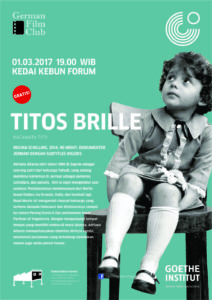

German Film Club
Wednesday, 1 March 2017, 7.00 pm
Auditorium Kedai Kebun Forum
Jl. Tirtodipuran 3, Yogyakarta
Open for public and free
presents
Tito’s Glasses (Titos Brille)
Director: Regina Schilling, 2014, documentary, 90 min., German with English subtitles
SYNOPSIS
Adriana Altaras, born in 1960 in Zagreb to Jewish parents, pursued a career in Germany as an actress, director and writer. Now she is looking for her roots. The journey takes her from Berlin via Gießen to Croatia, Italy and back again. The road movie TITO’S GLASSES examines a painful and sometimes comic family history affected by the Holocaust, going back to the years of World War II, the German occupation of Yugoslavia and the Partisan resistance movement. Through her journey through the places of the past, Adriana Altaras poses questions about her own complicated and ultimately very European identity.
“My father was a hero“, reports Adriana Altaras. He had fought in World War II with Tito’s Partisans against the Fascists. She herself was born in 1960 in Zagreb, the daughter of Jewish parents; later she built a career in Germany as an actress, director and writer. Now Adriana Altaras is looking for her roots. As a child, Adriana had acted in a Yugoslav Partisan film. Her father was a successful radiologist in Zagreb, who simultaneously enjoyed military honours and was a highly respected member of the Communist Party – until he was brought to court for the personal possession of an X-ray machine.
Escapes continually influenced the family history. Adriana’s mother tried to fleethe Nazis, but was arrested and detained in a concentration camp on the island of Rab – she was able to escape. Her father left his homeland after the trial and built a new life for himself as a radiologist in the Hessian city of Gießen. As a three-year-old, Adriana was smuggled into Italy from Croatia by her aunt, whom she lived with on Lake Garda until the age of seven. Then she was sent to a German Waldorf boarding school by her parents. With such a family history, shaped by a background of the Holocaust for generations to come, it can be difficult to develop a sense of home. So Adriana visits the places of her early childhood in Gießen once again, then goes to Slovenia and Croatia, speaks with relatives and old acquaintances, researches court papers, leafs through photo albums, watches old 8 mm home movies of her family and even the Partisan film she once played a part in.
On her journey, which is also a search for identity, Adriana encounters contradictions and surprising conflicts in her family history. Her father’s heroism may not have been all that he had made it out to be. He told them he had once played a crucial part in a Partisan struggle by repairing Tito’s broken glasses. This turns out to be a legend, as Tito didn’t yet wear glasses at the time. The parents’ marriage was not as harmonious as one might have been led to believe – the father had affairs with other women, all of them “boring blondes”, as Adriana learns, going through the photos. Criticismis also reserved for the former leader Tito. His political views were not sufficiently long-term in scope, and proper precautions weren’t taken. The state of Yugoslavia ended in civil war and disintegration.
TITO’S GLASSES is based on a book of the same name by Adriana Altaras. With her protagonist’s trust and an abundance of private archival material, the film maker Regina Schilling has succeeded in turning the story into a very meticulous and convincing documentary permeated by the present and the past. In the film, Adriana at one point explains the personality of an old acquaintance in Zagreb: “Like me, he suffers from an overdose of the past.” In this respect, the film tells a very European history, of the Holocaust, fascism and resistance, of new states and their demise. It is a history of turmoil.
Director’s Biography
Regina Schilling was born in Cologne in 1962. She studied Literary Criticism and Education, was employed as a press officer and has worked as a freelance journalist since 1997. She received a Grimme Award in 2012 for her documentary GESCHLOSSENE GESELLSCHAFT – DER MISSBRAUCH AN DER ODENWALDSCHULE.
For more infi please contact +62857-2580-9139 (Uniph)